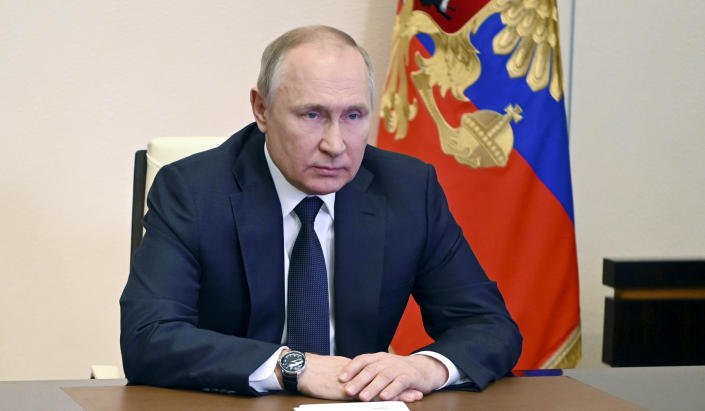WASHINGTON — U.S. Intelligence leaders on Tuesday floated the idea that Vladimir Putin may seek an exit from Ukraine if his war effort continues to stall, but that escalation of the conflict is likely to happen before the Russian president considers ending his attacks.
“We assess Putin feels aggrieved the West does not give him proper deference and perceives this as a war he cannot afford to lose. But what he might be willing to accept as a victory may change over time, given the significant costs he is incurring,” Director of National Intelligence Avril Haines told members of the House Intelligence Committee.
The heads of the nation’s intelligence agencies painted a bleak picture of the war as it winds through its second week. Intelligence agencies expect that food and water for some Ukrainians could run out in less than two weeks and that between 2,000 and 4,000 Russian troops have died so far.
Despite possessing a military arsenal superior to Ukraine in almost every respect, the Kremlin has performed much worse than predicted and has so far failed to take any of the country’s biggest cities.
CIA Director William Burns, a former ambassador to Moscow, warned Tuesday that Putin has now found himself in an untenable position.
“I think Putin is angry and frustrated right now. He’s likely to double down and try to grind down the Ukrainian military with no regard for civilian casualties,” Burns said of Russia’s efforts, which have already led to an estimated 2 million Ukrainian refugees.
“But the challenge that he faces — and this is the biggest question that’s hung over our analysis of his planning for months now … — he has no sustainable political endgame in the face of what is going to continue to be fierce resistance from Ukrainians,” Burns continued. “So I think that’s what his calculus has been. And I think that’s the reality of what he faces today.”
The intelligence leaders also said they are keeping close tabs on Putin’s “saber-rattling,” in which the Russian autocrat has reminded the world of his nuclear arsenal.
“I believe that when he says something, we should listen very very carefully and take him at his word,” said Lt. Gen. Scott Berrier, head of the Defense Intelligence Agency.
As the debate has raged in Washington about what role the U.S. should play in the conflict, lawmakers across the aisle have debated what it would take for Putin to end the invasion — or whether Russia is likely to be bogged down in Ukraine as an occupying force.
“It’s very hard to figure out what’s the off-ramp,” House Intelligence Committee Chairman Adam Schiff, D-Calif., said after the hearing. “What we can continue to do is continue to escalate the price that he and Russia have to pay for this.”
The West continued mounting its pressure on Russia to exit Ukraine. President Biden announced Tuesday that the U.S. would stop importing oil from Russia, and an ever-growing list of U.S. and international companies have suspended their business in Russia.
“One thing Putin does fear is the ability of the Russian people to rise up against him,” Schiff added. “Until he feels that his own regime is at risk, it’s hard to see him looking for an exit ramp.”
Another Democrat on the panel put the question a bit more bluntly.
“A lot of my constituents think that Putin is crazy, or he’s playing crazy. In an open setting, how do you assess Putin’s mental state?” Rep. Raja Krishnamoorthi, D-Ill., asked Burns.
“I think his views, congressman, on Ukraine and a lot of other issues, have hardened over the years. I think he’s far more insulated from other points of view, and people who would challenge or question his views,” Burns said. “In my opinion, that doesn’t make him crazy. But it makes him extremely difficult to deal with because of the hardening of his views over time and the narrowing of his inner circle.”



